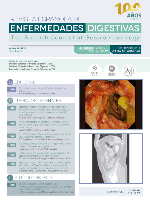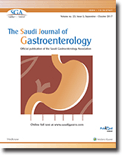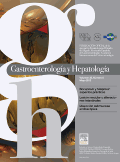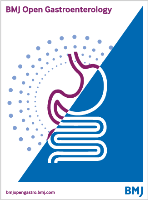
REVISTA ESPANOLA DE ENFERMEDADES DIGESTIVAS
Scope & Guideline
Connecting researchers and clinicians for better outcomes.
Introduction
Aims and Scopes
- Gastroenterology Research:
The journal covers a wide range of topics in gastroenterology, including inflammatory bowel diseases, functional gastrointestinal disorders, and gastrointestinal cancers. Research methodologies often include clinical trials, observational studies, and systematic reviews. - Endoscopic Techniques and Innovations:
There is a strong emphasis on advancements in endoscopic techniques, including endoscopic submucosal dissection, endoscopic retrograde cholangiopancreatography, and novel endoscopic interventions for various gastrointestinal conditions. - Hepatology and Liver Diseases:
Research on liver diseases, particularly hepatitis C, fatty liver disease, and liver transplantation, is a significant focus, addressing both clinical and epidemiological aspects. - Patient-Centered Care and Quality of Life:
The journal highlights studies that assess patient-reported outcomes, quality of life, and the psychosocial impact of gastrointestinal diseases, indicating a holistic approach to patient care. - Multidisciplinary Approaches:
The journal promotes research that involves multidisciplinary approaches, integrating various specialties such as surgery, nutrition, and pathology in the management of digestive diseases.
Trending and Emerging
- Personalized Medicine and Biologics:
There is a notable increase in research focusing on personalized medicine approaches, particularly the use of biologic therapies for conditions like inflammatory bowel disease and liver diseases, indicating a shift towards tailored treatments. - Impact of COVID-19 on Gastroenterology:
Studies exploring the impact of COVID-19 on gastrointestinal diseases, including complications and management strategies, have surged, reflecting the urgent need to understand how the pandemic affects patient care. - Microbiome Research:
Research on the gut microbiome's role in digestive health and diseases is increasingly prominent, highlighting its potential influence on treatment outcomes and disease prevention. - Emerging Diagnostic Technologies:
There is a growing interest in novel diagnostic technologies, such as artificial intelligence in endoscopy and non-invasive biomarkers, enhancing the ability to diagnose and monitor gastrointestinal diseases. - Telemedicine in Gastroenterology:
The utilization of telemedicine for managing gastrointestinal conditions has become a trending topic, particularly in response to the challenges posed by the COVID-19 pandemic, emphasizing accessibility and continuity of care.
Declining or Waning
- Traditional Pharmacological Treatments:
There appears to be a decline in studies focusing solely on traditional pharmacological treatments for gastrointestinal diseases, as there is a noticeable shift towards personalized medicine and biologic therapies. - Surgical Interventions:
Research on surgical interventions for gastrointestinal diseases has decreased, possibly due to the rising popularity and efficacy of less invasive endoscopic techniques. - Conventional Diagnostic Techniques:
The use of conventional diagnostic techniques, such as standard imaging and biopsies, is less frequently reported, as innovative methods like capsule endoscopy and advanced imaging techniques gain prominence. - Epidemiological Studies on Common Conditions:
Fewer studies are being published on the epidemiology of common gastrointestinal conditions, possibly due to a shift towards more complex and less common diseases that require specialized research.
Similar Journals

Frontline Gastroenterology
Transforming Understanding of Gastrointestinal DiseasesFrontline Gastroenterology is a leading academic journal published by the BMJ Publishing Group that plays a vital role in advancing the field of gastroenterology and hepatology. Established in 2013, this prestigious journal has established itself as a significant resource for researchers, healthcare professionals, and students alike, maintaining a commendable impact factor and consistently achieving a Q2 ranking in both gastroenterology and hepatology categories as of 2023. With its focus on disseminating high-quality, peer-reviewed research, Frontline Gastroenterology covers a wide scope of topics pertinent to the understanding, diagnosis, and treatment of gastrointestinal and liver diseases. Although it does not offer Open Access options, its content is accessible through various institutional and personal subscriptions, ensuring that critical findings reach an international audience. As the journal continues to converge into the future, it remains dedicated to fostering innovation and dialogue in gastroenterological sciences.

Pediatric Gastroenterology Hepatology & Nutrition
Empowering pediatric care with cutting-edge insights.Pediatric Gastroenterology Hepatology & Nutrition is a pivotal academic journal published by the Korean Society of Pediatric Gastroenterology & Nutrition, focusing on the critical fields of pediatric gastroenterology, hepatology, and nutrition. Located in South Korea, this journal aims to disseminate high-quality research, review articles, and clinical studies to advance knowledge and practice in the care of children with gastrointestinal and nutritional disorders. With a Converged Years span from 2012 to 2024 and categorized in the Q2 and Q3 quartiles in 2023 across multiple related fields, the journal holds a significant position within the academic community, reflecting its impactful contribution to the discipline. Although currently not open access, the journal ensures that content is accessible to a broad audience through various institutional subscriptions. The journal appeals to researchers, healthcare professionals, and students alike, providing an essential platform for the exchange of innovative ideas and research findings aimed at improving pediatric patient care.

Minerva Gastroenterology
Advancing Gastroenterology Through Innovative ResearchMinerva Gastroenterology, published by EDIZIONI MINERVA MEDICA, is a notable academic journal dedicated to advancing the field of gastroenterology and related disciplines. With an ISSN of 2724-5985 and an E-ISSN of 2724-5365, this journal gathers innovative research from diverse areas including internal medicine, endocrinology, and metabolism. Though characterized by its open-access policies, Minerva Gastroenterology aims to provide a platform for high-quality scholarly articles with an emphasis on critical reviews, clinical studies, and translational research. Since its inception in 2021, the journal has managed to secure a reputation reflected in its Q3 rank across multiple categories in 2023, as well as its standing in Scopus rankings, positioning it in the 45th to 47th percentile among renowned medical journals. Situated in Turin, Italy, it fosters collaboration and knowledge-sharing among researchers and practitioners, making it an essential resource for those seeking to deepen their understanding of gastroenterological conditions and enhance clinical practices.

Gastroenterology
Advancing Digestive Health Through Premier ResearchGastroenterology, published by W B Saunders Co-Elsevier Inc, is a premier journal dedicated to advancing the knowledge and practice within the fields of gastroenterology and hepatology. Established in 1945 and covering a wide range of topics related to digestive health, this journal holds a distinguished position in the academic community, as evidenced by its impressive Q1 status in both Gastroenterology and Hepatology categories, and its high rankings (4th in both disciplines) in Scopus, placing it in the top percentile for scholarly impact. With its commitment to publishing high-quality research, reviews, and clinical studies, Gastroenterology provides an essential resource for researchers, healthcare professionals, and students seeking cutting-edge insights that inform clinical practices and enhance patient care. Although it does not currently offer open access, the journal continues to serve as a vital platform for disseminating meaningful research that shapes the future of digestive disease management.

Saudi Journal of Gastroenterology
Advancing the frontiers of gastroenterology research.The Saudi Journal of Gastroenterology is a premier platform dedicated to advancing research and clinical practice in the field of gastroenterology. Published by Wolters Kluwer Medknow Publications, this open-access journal has been serving the academic community since 1995 from its base in India. With an ISSN of 1319-3767 and an E-ISSN of 1998-4049, the journal allows unrestricted access to a wealth of knowledge, fostering an environment where researchers, professionals, and students can engage with cutting-edge studies. As of 2023, it is categorized in the Q3 quartile within gastroenterology, ranking #74 out of 167 in Scopus, which places it within the 55th percentile of its field. The journal aims to disseminate significant findings, clinical trials, and innovative theories that shape the understanding of gastrointestinal disorders and practices. With a commitment to quality and relevance, the Saudi Journal of Gastroenterology is pivotal for anyone seeking to enhance their knowledge and expertise in this vital area of medicine.

Gastroenterologia y Hepatologia
Advancing knowledge in gastrointestinal and liver health.Gastroenterologia y Hepatologia, published by Elsevier España SLU, is a distinguished journal dedicated to advancing the fields of gastroenterology and hepatology. With a publication history spanning from 1982 to 2024, this journal is recognized for its commitment to disseminating high-quality research and reviews that address critical developments in the diagnosis and treatment of gastrointestinal and liver diseases. Although it currently ranks in the Q3 quartile in both gastroenterology and hepatology based on the 2023 metrics, the journal continues to attract a global audience of researchers, healthcare professionals, and students eager to engage with the latest findings. The journal is accessible in both print and electronic formats (ISSN: 0210-5705), making its valuable insights reachable to a broad spectrum of subscribers. By fostering a platform for rigorous scholarly communication, Gastroenterologia y Hepatologia plays a vital role in shaping the future of research in these essential medical fields.

BMJ Open Gastroenterology
Unveiling Cutting-Edge Discoveries in GastroenterologyBMJ Open Gastroenterology is a premier open access journal published by the esteemed BMJ Publishing Group, focusing on the dynamic and evolving field of gastroenterology. Established in 2014, the journal has rapidly ascended in stature, reflected in its impressive 2023 Q1 ranking in gastroenterology and its position within the top 25% of journals in the category according to Scopus. With a mission to disseminate high-quality, peer-reviewed research with global significance, the journal provides a vital platform for researchers, professionals, and students alike to share their findings and advancements in gastrointestinal medicine. Operating from its headquarters in London, England, the journal's open access format ensures wide visibility and accessibility of cutting-edge research, making it an invaluable resource for those dedicated to improving patient care and driving innovation in gastroenterological sciences. By engaging with this journal, contributors and readers can stay at the forefront of critical developments in the field, fostering a collaborative environment for knowledge exchange.

PRACTICAL GASTROENTEROLOGY
Your Essential Resource for Gastrointestinal AdvancesPRACTICAL GASTROENTEROLOGY is a distinguished journal dedicated to the field of gastroenterology, published by Shugar Publishing Inc in the United States. With an ISSN of 0277-4208, the journal serves as a pivotal resource for medical professionals, researchers, and students keen on staying abreast of the latest advancements and practical applications in gastrointestinal health. Although it does not currently operate under an Open Access model, it has been a respected publication since its inception, spanning significant years of research from 1989 to 2013 and resuming again from 2016 to 2023. Despite holding a current Q4 ranking in Gastroenterology with Scopus, its commitment to quality insights provides a platform for critical information dissemination, making it an essential read for those engaged in clinical practice and academic research. The journal’s objectives include addressing practical challenges in gastroenterology, bridging the gap between research and clinical implementation, and fostering ongoing education among practitioners in this dynamic field.

Clinical Gastroenterology and Hepatology
Advancing the Frontiers of Gastroenterology and HepatologyClinical Gastroenterology and Hepatology, published by Elsevier Science Inc, stands as a leading journal in the fields of gastroenterology and hepatology. With an ISSN of 1542-3565 and an E-ISSN of 1542-7714, this esteemed publication has earned its place in the top quartile (Q1) of both gastroenterology and hepatology categories as of 2023, ranking 6th out of 167 and 7th out of 82 respectively. The journal aims to disseminate innovative research, clinical studies, and case reports that advance the understanding and treatment of gastrointestinal and liver diseases. Targeted towards researchers, healthcare professionals, and students, it provides crucial insights into emerging therapies and medical advancements. Clinical Gastroenterology and Hepatology is not only a pivotal resource for contemporary gastroenterological research but also fosters collaboration and knowledge-sharing within the medical community. With a converging publication history from 2003 to the present, the journal continues to build on its solid foundation of scientific excellence and relevance.

DIGESTIVE DISEASES AND SCIENCES
Unveiling the complexities of digestive diseases.DIGESTIVE DISEASES AND SCIENCES, a renowned journal published by Springer, plays a pivotal role in advancing the fields of gastroenterology and physiology. With a rich publication history spanning from 1979 to 2024, this journal not only holds an impressive Q1 ranking in both categories but also ranks 34th out of 167 in Gastroenterology and 60th out of 193 in Physiology according to Scopus, reflecting its significant impact and reputation within the academic community. Despite being a traditional journal without open access options, it remains a crucial platform for researchers, professionals, and students seeking to disseminate their findings and stay abreast of the latest developments in digestive health. The journal is accessible to a global audience and is dedicated to publishing high-quality, peer-reviewed research, making it an invaluable resource for anyone involved in the study or treatment of digestive diseases.